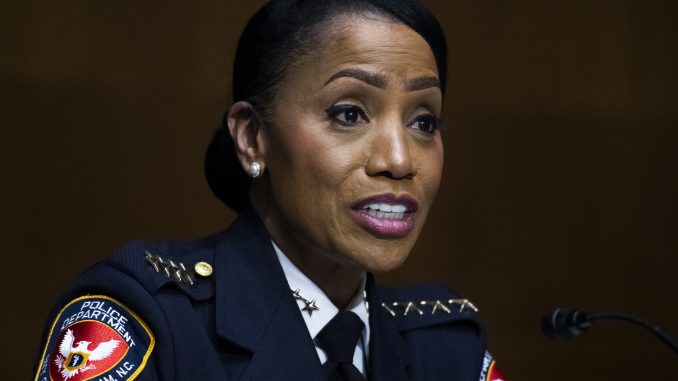
DURHAM — An increase in the city’s police budget was approved at the June 15 Durham City Council meeting, allocating a total of $70 million to the DPD, about 14% of the city’s $503 million budget. The vote was under heavy scrutiny in the aftermath of the George Floyd protests, with many activists calling for a reduction or even elimination of police budgets.
Call after call during the Monday night meeting, which was streamed online, demanded — in often harsh language — that the city’s police force be abolished, defunded or otherwise reimagined. Mayor Steve Schewel gave each commenter one minute but only allowed those who had signed up beforehand to speak due to the volume of calls.
After the comments, Schewel countered some points that were repeated in public comments, like that the police budget is a third of the total budget.
“Seventy million dollars is a lot. But it’s actually closer to about 14% of our budget,” he said. “Still a lot of money, but I want to make that clear. The thing I want to say about our police budget this year is this: We are increasing our police budget a total of about $1.2 million. We’re not adding any positions. We’re not adding any programs. Our police officers are not getting a pay increase, just like everybody else in the city.”
To be responsive to the demands of those wanting radical change to policing in Durham, the city council added in $1 million for a Community Health and Safety Task Force that would potentially take on some of the responsibilities of policing the city over time.
Durham Beyond Policing, a local nonprofit group, organized a lot of the opposition to the budget and proposed the task force as an eventual replacement for armed police. The group’s supporters sent more than 4,000 emails to councilmembers over the previous 10 days, according to a statement by the mayor. Many of the public commenters during the meeting also identified with the group.
The group’s main demand is that the $70 million police budget be reallocated to “community needs,” and these would be determined by the Community Health and Safety Task Force.
Another push to pull police back from their current roles is taking place in Durham’s schools. A group of students, led by the Southern Coalition for Social Justice’s “Youth Justice Project,” is calling for the removal of all resource officers in Durham’s public schools, to be replaced by counselors and social workers.
On June 13, the group held a “March for Black Students” at the Durham Public Schools headquarters. They’ve collected more than 3,000 signatures as of June 16 from students who agree with their petition demanding that “the Board of Education must immediately terminate its Memorandum of Understanding and discontinue any partnership with the Durham County Sheriff’s Department.”
Durham Public Schools responded with a statement, saying, “In light of recent nationwide events of racism and overreach in law enforcement, we understand the concerns that have been expressed by some of our students and community. We are aware of the Youth Justice Project’s call to conduct a thorough Impact Assessment of our SRO program by the end of the 2020-21 school year and we are open to that. We would also be happy to participate in a community forum to learn from our stakeholders and develop solutions to ensure the safety and security of our students. Transparency is essential to building trust in our community.”
Maurice Hayes, a retired Durham police lieutenant of 28 years, told NSJ he thinks building trust in the community is the missing key and was how policing was done during his career. Hayes, who is African American, said removing SROs from schools though would be a “big mistake” because it represents exactly the kind of personal trust-building that is required for a successful police relationship with the citizens.
“When I came through, it was more community-oriented,” said Hayes, crediting former Durham Police Chief Steven Chalmers for this focus. “His thing was a holistic approach to policing, where we got involved in a lot of things as far as helping people.”
Hayes said they would go to youth sports games, hold cookouts for neighborhoods, go door-to-door to meet the residents in their beat and go to HOA meetings. He said on three occasions, he had homicide suspects find him when he was off-duty and turn themselves in to him because of the trust he had built with them.
“Boarding up houses, cleaning up vacant lots, getting graffiti off of houses, that’s the stuff we used to do. And the city was all-in. And I just don’t see that now,” said Hayes, who ran the first gang unit in the city and also worked in narcotics and as a homicide detective. “But one incident, of course, will turn everyone against you.”
He said a lot of officers are still doing things like buying bicycles, cleaning up vacant lots and other things in their beats, but that many other officers just stay in their cars.
“What I’ve seen is there’s not trust from the community for the police,” he said. “And this is what happens when the police remove themselves from the community.”
Groups like Durham Beyond Policing see racial disparities and high-profile incidents like the George Floyd case as evidence that racism in policing is widespread and that communities would be safer without police.
“That’s not true,” Hayes said, adding he doesn’t think social workers or psychiatrists could simply walk in and handle many of these situations without police being there as well. “We’re not going to be able to let someone respond, like a psychiatrist or a social worker, and put themselves in harm’s way. Like if you respond to a call, and you see a social worker is needed, police should spearhead that.”
Hayes agreed that police could institute a lot of community-focused changes without increasing their budgets, but he did say Durham’s police would be hard hit by any further cuts.
“Durham is overworked now, at 65% staffing level, with the amount of calls they get. I can tell you that,” Hayes said.



